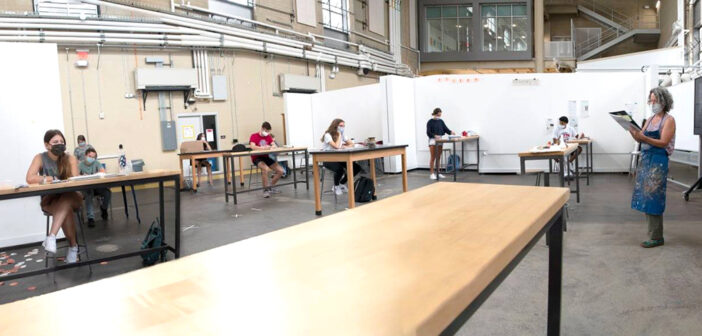The adjustment to online classes, while impactful for students and faculty in every major, have specifically been felt within the departments of theatre and art, architecture and design since most courses are in-person and involve hands-on learning.
Zoellner Arts Center and Building C on Mountaintop Campus were open for both departments for the first month of the semester. When Lehigh went fully remote following a COVID-19 outbreak, both departments figured out new ways to make their courses engaging and exciting virtually.
Hallie Wilson, ’23, a double major in art and art history, said the professors are going above and beyond to make sure the students are getting the most out of their education during this time. She said although her learning experience is different this semester, it’s not necessarily worse.
Wilson said her drawing class is more independent, but her professor remains present.
“I was in quarantine when we went online, and my teacher took my art supplies from Mountaintop and drove them down and dropped them off at my apartment,” Wilson said. “That’s what I’m saying when these teachers are going above and beyond.”
Wilson said the main difference between being in-person and online now is that students don’t have access to Mountaintop Campus. She said she had to transform her bedroom from a place that she normally relaxes to a place where she can work on her art projects.
“I think we need to give the teachers some credit because they’re really trying their best here,” Wilson said.
Kashi Johnson, chair and professor of theatre, said when COVID-19 hit campus last year, everyone in the department adapted to teaching classes online.
She said the department had an active summer planning for a virtual season since they didn’t know what Lehigh was going to do and knew that there weren’t going to be live performances.
“It was a blessing that we had the first half of the semester in-person, so there were roots that were built,” Johnson said. “We are devising a whole season called “Reboot the Future” where we’re doing all of these different devised projects and some familiar projects, but basically everyone in the department that wanted to create something this semester — students, faculty, staff — has been given ample opportunities to express themselves during this time.”
The department is having students do virtual projects where students are able to collaborate, assistant direct and conceive projects, Johnson said. She said instead of costumes, they are now learning how to do virtual reality animation techniques for their projects.
Johnson said one of the projects assigned for a hip-hop theatre course she teaches required students posting videos on YouTube rather than performing live. This allowed her students to become their own video directors, art directors and cinematographers, she said.
“I think that I try to get to a place with all my students where the screen doesn’t limit us,” Johnson said. “These projects are unfolding before our eyes. Instead of a team of people saying, ‘No, we always do it like this,’ now we’re able to say, ‘Hey, let’s try it like this.’”
Kenzie Drangel, ’23, theatre major, said she is taking two theatre courses this semester and feels that both have been successful. She said she is taking a props course that includes lab hours where students go to Zoellner and work on their props in a workshop. When Zoellner closed, the students have been making their props at home, Drangel said.
Drangel said the department will be hosting virtual productions this year that students can watch over Zoom.
“I think it’s going to be interesting to see how the Zoom productions work out,” Drangel said. “It’s definitely going to test how theatre works outside of the parameters of an actual theatre.”






Comment policy
Comments posted to The Brown and White website are reviewed by a moderator before being approved. Incendiary speech or harassing language, including comments targeted at individuals, may be deemed unacceptable and not published. Spam and other soliciting will also be declined.
The Brown and White also reserves the right to not publish entirely anonymous comments.